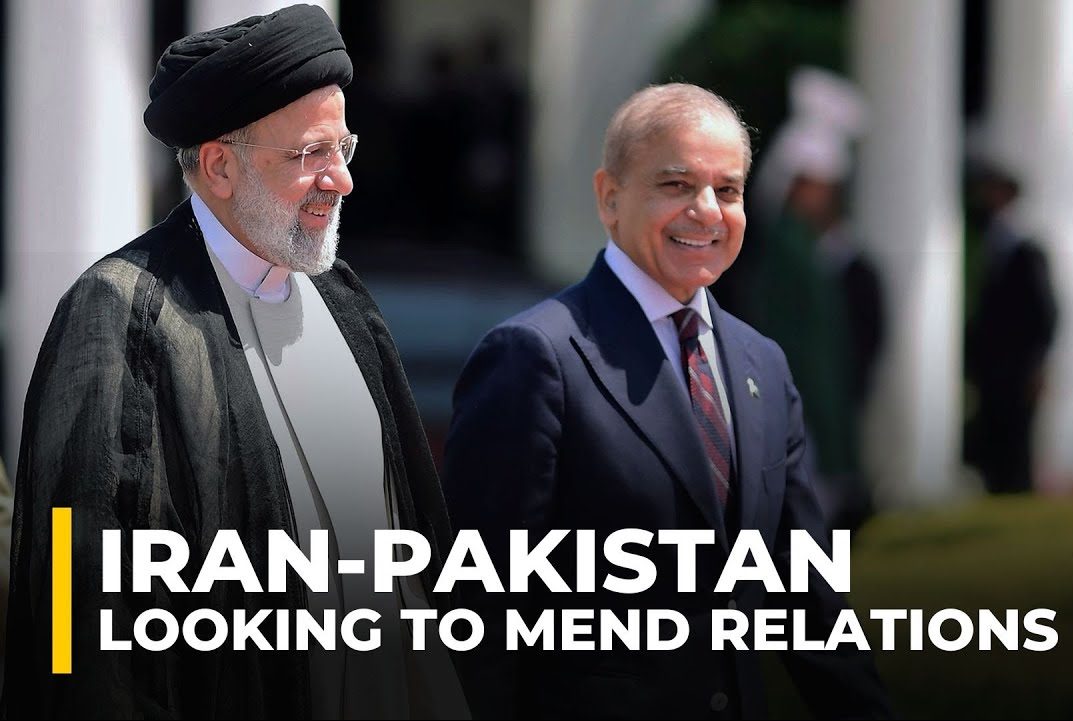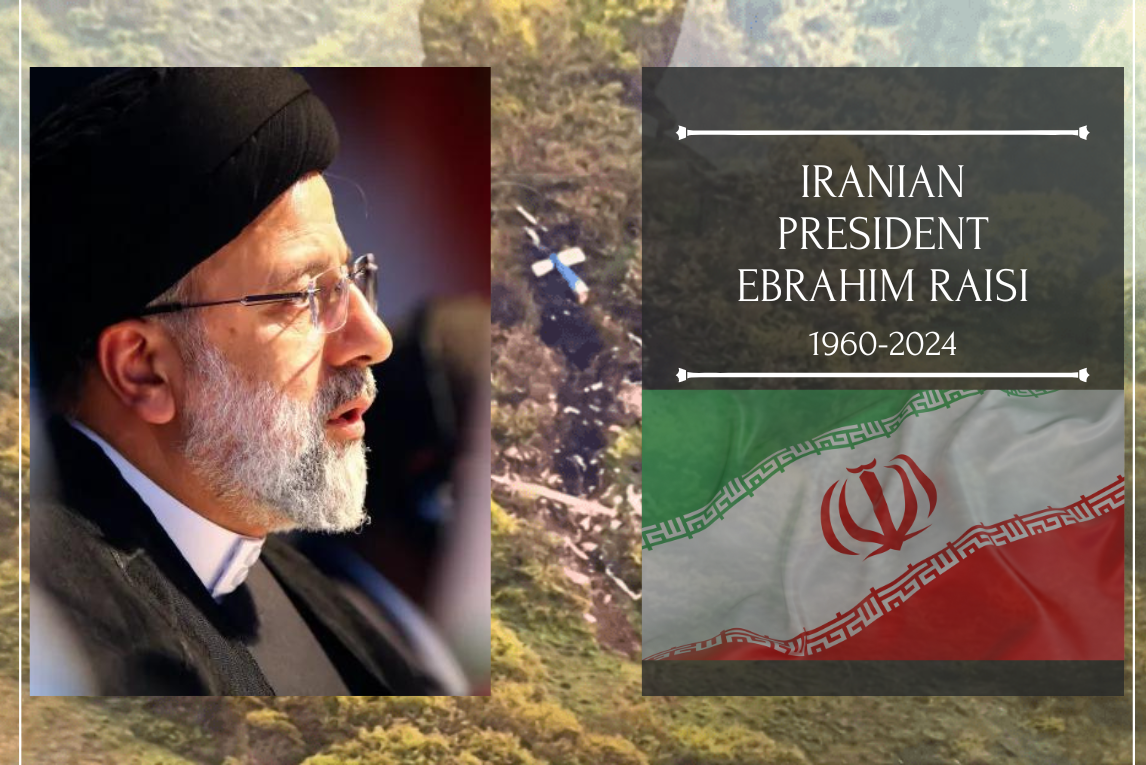Days after Iran and Israel launched strikes against one another, raising the possibility that the Gaza war will turn into a regional battle, Iranian President Ebrahim Raisi is in Pakistan for a three-day visit to talk about bilateral and regional relations.
Raisi is most likely to meet with Shehbaz Sharif, the prime minister of Pakistan, as the two neighbors attempt to patch things up following tit-for-tat missile launches in January.
According to local media, Raisi will also meet General Asim Munir, the commander of Pakistan’s military, which has significant political and economic sway over the country in South Asia.
As Aljazeera stated: Raisi is set to hold talks with top Pakistani leaders as the two nations aim to boost trade and resolve border issues.
What is the itinerary for this trip?
Raisi landed in Islamabad, the capital, on Monday as the two neighbors worked to strengthen their energy, border, and commercial connections.
The Iranian presidential office released a statement on Monday stating, “The Islamic Republic of Iran, in line with the neighborhood policy… wants to promote relations with Pakistan. During this trip, the delegate will discuss various issues including economic and commercial issues, energy, and border issues with the government of Pakistan.”
Pakistan’s Ministry of Foreign Affairs urged for strengthening bilateral relations in a statement released on Sunday.
“The two sides will have a wide-ranging agenda to enhance cooperation in diverse fields including trade, connectivity, energy, agriculture, and people-to-people contacts and further strengthen Pakistan-Iran ties,” the statement read.
According to the statement, the Iranian president would focus on economic and bilateral relations while visiting important cities including Karachi and Lahore.
Raisi’s trip is “an effort to secure an expression of support from Islamabad and Rawalpindi [military leadership] for Iran – as it stumbles deeper into a dangerous conflict with Israel,” according to a written statement provided to Al Jazeera by Mosharraf Zaidi, a partner at advisory services firm Tabadlab and a former adviser to the Foreign Ministry.
According to Zaidi, Iran’s strategic analysts are aware that Pakistan is constrained in its options for how it might participate in the continuing Middle East conflict by several domestic political issues as well as an expanding array of economic demands.
The state of relations between Pakistan and Iran?
There has long been tension between Pakistan and Iran, with each country blaming the other for not doing enough to control armed organizations.
When Iran launched airstrikes into Pakistan in January, killing two children, tensions along the border worsened. According to Iranian official media, two facilities of the militant organization Jaish al-Adl were the target of the strike. Pakistan fired a missile into Iranian territory in retaliation, asking for the removal of its ambassador from Tehran.
However, the two neighbors decided to reduce hostilities, and Tehran sent its senior ambassador to Islamabad right once to repair relations. The two nations decided to work together to combat the “menace of terrorism,” particularly in the border region. Before Raisi’s arrival, Islamabad and Tehran discussed fighting “terrorism.”
Pakistan had a caretaker government in place at the time. Thus, Iranians had suggested that a visit may be made to mend fences and restore trust following the election of a new administration, according to Muhammad Faisal, a PhD scholar at the University of Technology Sydney who specializes in Pakistan’s foreign affairs.
Why is there a need between Iran and Pakistan?
Pakistani experts on foreign policy have supported resuming contact with Iran despite the border disputes.
Pakistan shares problematic boundaries with both Afghanistan and India. Therefore, after the border tensions in January, senior Pakistani diplomat Maleeha Lodhi told Al Jazeera, “Having a normal, stable relationship with Iran has been of utmost importance for Pakistan, and it remains so.”
The goal of Islamabad and Tehran has been to increase their present bilateral commerce, which exceeds $2 billion.
According to Faisal, there is a substantial unofficial trade in crude oil and liquefied petroleum gas (LPG) between the two nations, as reported by Al Jazeera. He continued by saying that Balochistan province and other Pakistani border regions also receive power from Iran.
At the Mand-Pishin border crossing, Sharif and Raisi opened the first border market in May 2023.
Furthermore, there are strong cultural and religious links between the two neighbors; each year, tens of thousands of members of Pakistan’s Shia minority travel to Iran for pilgrimage.
900 km (559 miles) of shared border, according to Tabadlab’s Zaidi, hasn’t resulted in meaningful commerce connections or people-to-people interactions.
“For religious tourism the travel is limited, and trade occurs primarily outside the formal domain,” he stated.
The Iranian president set a goal of $10 billion in bilateral commerce the night before his trip, claiming that the two nations’ political and economic ties are not at the same level. They had set a $5 billion goal for bilateral trade in August.
The US imposed several restrictions on Tehran due to its nuclear program. This opposes the idea of building a pipeline that would allow Iran to export natural gas to Pakistan.
Faisal, from the University of Technology, Sydney, speculated that the talks would touch on the gas pipeline connecting Iran and Pakistan.
What is Pakistan’s response to the tensions between Iran and Israel?
Pakistan’s Foreign Ministry released a statement on April 14, one day after Iran launched strikes on Israel, urging a de-escalation. The incidents were described as “the consequences of the breakdown of diplomacy” in the statement.
The ministry statement stated, “These also highlight the ‘grave’ implications in cases where the UN Security Council is unable to fulfill its responsibilities of maintaining international peace and security.”
It went on to say that Pakistan emphasized the need for international action to stop hostilities in the area and to achieve a truce in Gaza.
“Restoring peace and stabilizing the situation is now extremely important. We urge everyone to proceed with the greatest caution,” the message said.
Pakistan has no direct lines of communication with Israel and does not recognize it.
“Speculation regarding pressure from GCC [Gulf Cooperation Council] nations on Pakistan to alter its Palestine policy has grown in the last few years. Nothing suggests that such a shift is imminent, according to Zaidi.










One Response